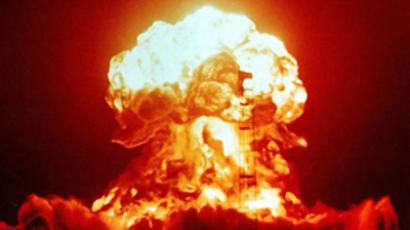Israel celebrates Independence Day with cautious eye to the future

On the 62nd anniversary of its independence, soul-searching in Israel is accompanying the cookouts as a host of issues continue to haunt the government of PM Benjamin Netanyahu.
Perhaps the best way to get a sense of Israel’s present state of mind is by quoting a part of an editorial in today’s Haaretz newspaper: “Israel's 62nd Independence Day finds it in a kind of diplomatic, security and moral limbo that is certainly no cause for celebration. It is isolated globally and embroiled in a conflict with the superpower whose friendship and support are vital to its very existence. It is devoid of any diplomatic plan aside from holding on to the territories and afraid of any movement. It wallows in a sense of existential threat that has only grown with time. It seizes on every instance of anti-Semitism, whether real or imagined, as a pretext for continued apathy and passivity.”
Judging by that candid description, Israel is wallowing through a major funk, and the tough leadership style of Benjamin Netanyahu, some political analysts say, seems to be at least part of the problem – at least when it comes to relations with Washington.
Thus far, the chemistry that exists between US President Barack Obama and Netanyahu has been limited to only producing fireworks. The grand finale came in March when Vice President Joe Biden paid a visit to Israel in an effort to pave the road to so-called “proximity talks” between Israeli and Palestinian leaders. It was at this very moment that the local authorities in Jerusalem, supposedly without Netanyahu’s approval, announced plans to construct 1,600 settler homes in highly contested East Jerusalem – the place where Palestinians hope to have the capital of their future state.
If Israel was testing the mettle of America’s first black president, it got much more than it was bargaining for: Washington immediately went on a diplomatic offensive as one top official after another scolded Israel for its imprudence.
"It is incumbent on both parties to build an atmosphere of support for negotiations and not to complicate them," Biden said in a media statement alongside Palestinian President Mahmoud Abbas in the West Bank city of Ramallah. "Yesterday the decision by the Israeli government to advance planning for new housing units in East Jerusalem undermines that very trust, the trust that we need right now in order to begin … profitable negotiations."
US Secretary of State Hillary Clinton jumped into the fray, saying America was “insulted” by the announcement, which continues to cloud bilateral relations between the historical allies to this day.
Meanwhile, UK Foreign Secretary David Miliband also rebuked Israel over the ill-timed announcement, saying it was critical to promote a "vital Palestinian state" that can exist alongside Israel.
"I condemn this as quite the wrong decision at the wrong time," Miliband told reporters after a lecture at the Massachusetts Institute of Technology in Cambridge, Massachusetts.
In short, it is becoming clear that international patience over the question of Palestinian statehood is wearing thin. But even Israeli officials seem ready to bring the lengthy standoff to a close. Ehud Barak, the Israeli defense minister warned on Monday that the world would not allow Israel to rule over Palestinians forever.
Barak told Israel Radio that Israel’s only hope for restoring relations with the United States was by embarking on a peace initiative that addressed all the major issues that divide Israelis and Palestinians.
“There is no other way, whether you like it or not, than to let [the Palestinians] rule themselves,” he said.
There have even been suggestions that Washington will eventually impose its own peace plan on the region, an idea that did not sit well with Netanyahu.
“I don’t believe anyone will seriously think that you can impose peace,” the prime minister said. “Peace has to come from the parties sitting down with each other, resolving their differences.”
Does Iran present an existential threat to Israel?
The fissure in Israeli-US relations comes at a very sensitive time for Israel, which is trying to garner international support for “crippling” sanctions against Iran, which is suspected of developing a nuclear weapons program under the cover of a civilian energy program.
Barak, in the same interview on Monday with Israel Radio, said that he did not believe that Iran posed an “existential threat” to Israel at the present moment, but that did not mean that Israel should “fall asleep.”
"I prefer to refrain from speculation about the future," Barak added. "Right now, Iran does not pose an existential threat to Israel. If Iran becomes nuclear, it will spark an arms race in the Middle East. This region is very sensitive because of the oil flow – the region is important to the entire world. The fact that Iran is not an immediate threat, but could evolve into one, means that we can't let ourselves fall asleep."
Meanwhile, US Defense Secretary Robert Gates on Sunday said the United States was determined to protect “our interests” in the region.
"There should be no confusion by our allies and adversaries that the United States is properly and energetically focused on this question and prepared to act across a broad range of contingencies in support of our interests," Gates said in the statement, issued to refute depictions of a memo in a New York Times report.
A US draft proposal of possible sanctions against Iran include restrictions on Iranian banking, an arms embargo, stiffer measures against Iranian shipping and a ban on new investments in Iran's energy sector.
Also Sunday, Admiral Mike Mullen, chairman of the US military's Joint Chiefs of Staff, spoke to reporters after addressing a forum at Columbia University in New York, saying that "it's very hard to predict outcomes there" in his appraisal of “how to address the Iranian threat.”
Mullen lamented the Catch-22 situation that says a military attack on Iran to prevent it from acquiring nuclear weapons would be every bit as disastrous as if Iran was allowed to have such an arsenal.
We do not have "much decision space to work in because of both outcomes – having a weapon and striking generates unintended consequences that are difficult to predict."
"I think Iran having a nuclear weapon would be incredibly destabilizing. I think attacking them would also create the same kind of outcome," Mullen added.
But for Israel, the main task at hand is to mend relations with Washington and prove to the international community that it is really sincere about helping to create a Palestinian homeland, so that Palestinians too may enjoy their own independence day in the near future.
Such crucial steps would certainly help Israel to enjoy a much more carefree Independence Day celebration than is presently the case.













